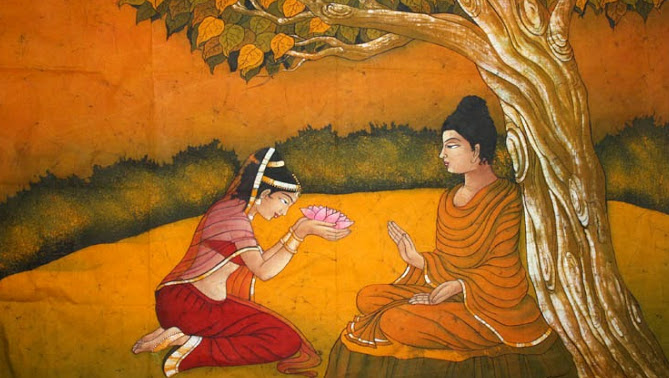209. Giving himself to things to be shunned and not exerting where exertion is needed, a seeker after pleasures, having given up his true welfare, envies those intent upon theirs.
210. Seek no intimacy with the beloved and also not with the unloved, for not to see the beloved and to see the unloved, both are painful.
211. Therefore hold nothing dear, for separation from the dear is painful. There are no bonds for those who have nothing beloved or unloved.
212. From endearment springs grief, from endearment springs fear. For one who is wholly free from endearment there is no grief, whence then fear?
213. From affection springs grief, from affection springs fear. For one who is wholly free from affection there is no grief, whence then fear?
214. From attachment springs grief, from attachment springs fear. For one who is wholly free from attachment there is no grief, whence then fear?
215. From lust springs grief, from lust springs fear. For one who is wholly free from craving there is no grief; whence then fear?
216. From craving springs grief, from craving springs fear. For one who is wholly free from craving there is no grief; whence then fear?
217. People hold dear him who embodies virtue and insight, who is principled, has realized the truth, and who himself does what he ought to be doing.
218. One who is intent upon the Ineffable (Nibbana), dwells with mind inspired (by supramundane wisdom), and is no more bound by sense pleasures — such a man is called “One Bound Upstream.” [18]
219. When, after a long absence, a man safely returns from afar, his relatives, friends and well-wishers welcome him home on arrival.
220. As kinsmen welcome a dear one on arrival, even so his own good deeds will welcome the doer of good who has gone from this world to the next.
“Piyavagga: Affection” (Dhp XVI), translated from the Pali by Acharya Buddharakkhita. Access to Insight (BCBS Edition), 30 November 2013.
Link to this article
Piyavagga: Dear Ones
209
Having applied himself
to what was not his own task,
and not having applied himself
to what was,
having disregarded the goal
to grasp at what he held dear,
he now envies those
who kept after themselves,
took themselves
to task.
210-211
Don’t ever — regardless —
be conjoined with what’s dear
or undear.
It’s painful
not to see what’s dear
or to see what’s not.
So don’t make anything dear,
for it’s dreadful to be far
from what’s dear.
No bonds are found
for those for whom
there’s neither dear
nor undear.
212-216
From what’s dear is born grief,
from what’s dear is born fear.
For one freed from what’s dear
there’s no grief
— so how fear?
From what’s loved is born grief,
from what’s loved is born fear.
For one freed from what’s loved
there’s no grief
— so how fear?
From delight is born grief,
from delight is born fear.
For one freed from delight
there’s no grief
— so how fear?
From sensuality is born grief,
from sensuality is born fear.
For one freed from sensuality
there’s no grief
— so how fear?
From craving is born grief,
from craving is born fear.
For one freed from craving
there’s no grief
— so how fear?
217
One consummate in virtue & vision,
judicious,
speaking the truth,
doing his own task:
the world holds him dear.
218
If
you’ve given birth to a wish
for what can’t be expressed,
are suffused with heart,
your mind not enmeshed
in sensual passions:
you’re said to be
in the up-flowing stream.
219-220
A man long absent
comes home safe from afar.
His kin, his friends, his companions,
delight in his return.
In just the same way,
when you’ve done good
& gone from this world
to the world beyond,
your good deeds receive you —
as kin, someone dear
come home.
“Piyavagga: Dear Ones” (Dhp XVI), translated from the Pali by Thanissaro Bhikkhu. Access to Insight (BCBS Edition), 30 November 2013
Link to this article







